OP2 Sequence
 |
 |
 |
 |
 |
 |
 |
 |
OP2: 「GHOST IN THE SHELL ARISE」 by Cornelius
 |
 |
 |
 |
 |
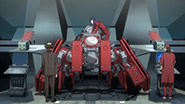 |
 |
 |
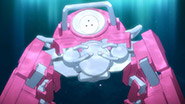 |
 |
 |
 |
 |
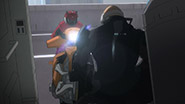 |
 |
 |
 |
 |
 |
 |
 |
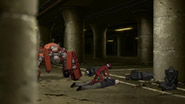 |
 |
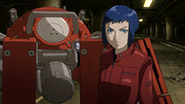 |
 |
 |
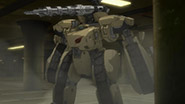 |
 |
 |
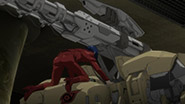 |
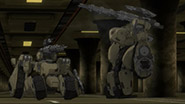 |
 |
 |
 |
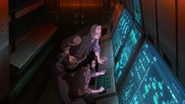 |
 |
 |
 |
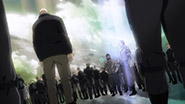 |
 |
 |
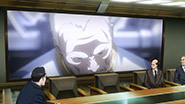 |
 |
 |
 |
 |
 |
 |
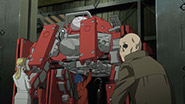 |
 |
 |
 |
 |
 |
 |
 |
 |
 |
 |
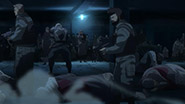 |
 |
 |
 |
 |
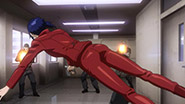 |
 |
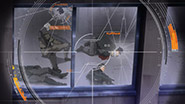 |
 |
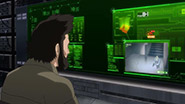 |
 |
 |
 |
 |
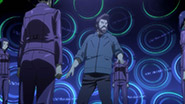 |
 |
 |
 |
 |
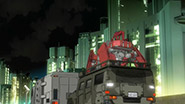 |
 |
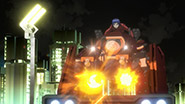 |
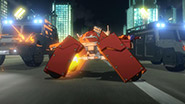 |
 |
 |
 |
 |
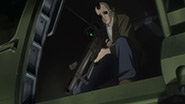 |
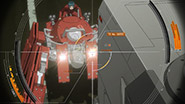 |
 |
 |
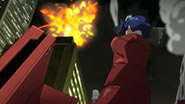 |
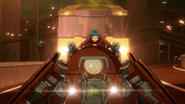 |
 |
 |
 |
 |
 |
 |
 |
 |
 |
 |
 |
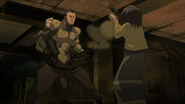 |
 |
 |
 |
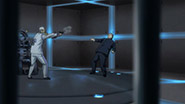 |
 |
 |
 |
 |
 |
 |
 |
 |
 |
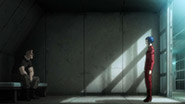 |
 |
 |
「Border:2 – Ghost Whispers」
As the second part of a quadrilogy, one of the vital things this episode needed to do was serve as a proper bridge between the introductory portions of the series and the overarching plot it wants to give us. This meant that Ghost Whispers needed to do three big things:
- Have a solid stand alone story that also sets up the creation of Motoko’s independent unit.
- Give hints at, reveal, or start the major plot line it’s planning to hit in the third and fourth movies.
- Do all of the above while maintaining the distinctive atmosphere of a Ghost in the Shell franchise while ensuring that it continuing to build on the style that the first movie introduced.
With ARISE 02 finally here, I’m glad to say that it does exactly that. Powered by a setting different from any of the previous iterations, all of the necessities were addressed superbly, and I dare say I liked this better than the first.
Of course, when I mean different setting, I don’t mean the fact that the whole locale is different or anything of the sort. ARISE still takes place in the same fictional metropolis as its predecessors, but the important thing to note is that it does so in a time period that none of the previous series have covered extensively. Whereas both the original movie and series seem to take place multiple years after non-nuclear World War IV, ARISE seem to be set some years earlier in a period immediately following the war. The concepts of corruption, national pride, political bantering, postwar concessions, and war crimes are on the forefront more than ever before, and it giving way to a setting that has the potential to provide all sorts of intrigue. We’re at a point where Japan is struggling to maintain what it still has (while trying to rebuild), and there’s just a lot here that ARISE is starting to tap in with its second movie.
Point in fact, ARISE 02’s entire plot line revolves around the aforementioned. The Vice Minister’s busy trying to profit from the sales of a key military database by scapegoating unit leader Soga Kazuya in the war crimes court, Kazuya’s unit tries to turn the tables back on him by taking the city’s 20 million inhabitants hostage, and Kazuya himself is busy trying to use the opportunity to expose the war crimes committed by nations throughout the war. It’s a weave of multiple plot lines that utilizes the current setting to its storytelling advantage, and it’s something that arguably could’ve only been done with the time period we have here in ARISE.
In turn, all of these threads also serve to provide the perfect storm from which to allow Motoko to build her independent squad. Sometimes, you need to capitalize on whatever chances you can get, even if it’s a large scale disaster. And just like she did in Stand Alone Complex, Motoko manages to do so with her ragtag group of Paz, Saito, and the mysterious “special forces agent” VV. But however fabulous the developments leading to its creation were, it wasn’t so much about its success—we knew this was going to happen—as it was the symbolic meaning behind it all. It was the creation of Motoko’s squad. She of the “I won’t take just anybody,” “I can kick all your asses and look good doing it,” “gorilla woman” personality. It’s a squad made not only of some of the finest personnel around, but mostly consisted of members who were former military and/or had lost their way following the war (or recent developments).
Considering the context, it’s a fitting gesture that not only counters the culture of a nation willing to throw away those that fought for it, but cements Motoko as the great character she always has been. She’s been my favorite character for as long as I remember, and what she accomplishes in this movie are just some of the reasons why. In the end though, her own quote says more about her character than any of my words can:
“I don’t want anyone who’s in it for the money or postwar concessions. It’ll be a team formed on skill, with no ranks, and given top priority—formed on a fixed standard that will be needed everywhere and in any age.”
And this is what I’m talking about. She’s the perfect amalgamation of idealism, skill, and wit—leading by example and by force of her unrivaled charisma. She’s a character unlike any other—a true lithium flower.
What makes this all the more significant however, is how she brings up the concept of age. Because again, this is the key point in Japan’s post-war development. It’s a new age unlike any of the ones that came before it, but ultimately, it’s just something that will give way to another “age of ______” in the future. As such, her desire to transcend this notion of “age” is not only a perfect representation of her, but of humanity’s propensity to try and fight against our limits (specifically the notion of time). The usage of old clunkers not susceptible to hacking just highlights this notion further, as does the whole Logikoma bit, as its outdated technology makes it an ironic foundation for the movie’s major plot line.
Ultimately though, all of these developments culminate in one key revelation: the fact that a rogue AI was behind the scenes the entire time, and it feels like this may be the thread that ties the last two movies together. It’s not exactly the most unique of plot twists considering its previous usage in the GITS universe, but it does feel at least fitting considering the series’ context. Whether it ends up being the actual main plot line remains to be seen—it’s highly possible we did see the last of this AI—but if the second movie’s demonstrated anything, it’s that ARISE has a lot to offer either way. This may not be the Ghost in the Shell that many fans wanted, but it’s holding its own as a solid addition to the Ghost in the Shell franchise. Because while it’s quite different stylistically, it manages to keep the atmosphere we’ve come to expect from series within this franchise, and it doesn’t forget its origins either—constantly referencing or demonstrating influences from both the original movies and Stand Alone Complex. For better and for worse, this is a modern take on GITS and I’m liking this more and more as it goes on. It’s just too bad that the next movie doesn’t come out until the end of June. TOGUSA!
Author’s Notes:
ED2 Sequence
 |
 |
 |
 |
ED2: 「外は戦場だよ」 (Soto wa Senjou da yo) by 青葉市子 (Ichiko Aoba)
Preview
 |
 |
 |
 |

For some reason, the american agent reminded me more of SAC’s Major than Arise’s teenage replacement. I still find the new Major a poor substitute. I hope the dub will change that but i doubt it.
Be careful saying anything negative about anything on RC, you’ll be downvoted to hell and back regardless of the fact that people can have opinions different than others…
Well, that is what the thumbs are supposed to be used for, right?
I liked it at first but by the end i felt like they put way too many twists in it, for no reason, other then having them.
I’m not really sure what you’re on about. One of the big draws of the show is its complex treatment of international subterfuge and the development of artificial intelligence, all of which comes into play here. It’s actually easier to grasp what went on this episode than the previous one, and the only substantial difference in style between the twists here and the ones in SAC are that these are presented much faster.
And I don’t see why you would be bothered by the twists or feel that they’re contrived. If there are extra twists thrown in the end, well, that’s probably because it’s not a completely isolated episode but part of an overarching whole. I totally expect events and background players from this story to come around again in the following episodes.
I loved it, screw all naysayers, that is all. Not much to say about it, it’s Ghost in the Shell.
Actually, from my own opinion, all GITS adaptations could be a very good teaching material for social informatics.
False memories is the one of the major element in this instalment and it is highly related to ICT.
After re-watching the movies and TV-series, those ideas that have been introduced, I can easily refer to what I have learned from my class. It is really enjoyable watching it while it also makes you to think deeper because those are potentially threats and possible outcomes in the near future when IT technologies are getting more advance.
Sorry to say that this actually felt more like reality asserting itself and becoming an anthropomorphic force to punish idiots.
Deliberately set up and abuse your elite soldiers? Surprise, surprise. They take offense to that.
Create a nation-wide traffic system that controls everything? Amazing! It turns out that doing that is stupid and that maybe they should at least have installed some fail-safe’s so it couldn’t be taken over by a few people with supercomputers. But I suppose I’m being too critical of the Japanese government. After all, it’s not as though they’re strategic rivals possess supercomputers and in the event of a war would see using that kind of flaw as a point to attack…
But the AI… well even though the movie occurs because the Japanese government was taking stupid pills, it could more or less work but the twist about the AI feels like they’re trying to get back the first GITS movie without getting the point of the AI in the first GITS movie.
And I have to note, we have ranks in the military (and pretty much everything) for a reason. So that when there’s a difficult decision that needs to be made quickly, you have one person presumably with the skills, talent and experience to make the right decision.
So if I were to give the previous Arise movie an 8/10, this one unfortunately is a 7 or even 6/10. Really hoping that the third doesn’t require people to be stupid for the plot to happen (awaiting angry downvotes without people even bothering to offer a reason for that or an actual defense of the movie in 3,2,1…)
They are in an immediately post-war world, and a war that they apparently lost the most in. Other countries probably aren’t looking to attack them (they did that enough already), and Japan has more internal and external problems than they can count. War focuses a nations’ efforts outward, and no they have to deal with all the shit that happened within their government during the war, power shifts, rampant corruption, etc.
The no ranks thing is easy: if someone outranks you, and they make a stupid-ass decision, you have no power to override it. Everyone that is equally capable in their own field being equal in rank guarantees that all angles will be covered. With an army, you have mid-level leaders from different fields who give reports to their superiors and allow them to make an informed decision. Within a small team, that’s pretty cumbersome and undesirable, at least in my opinion. On her team, everyone has the skills, talent, and experience to make proper decisions, especially if they have a few agreed-on protocols.
Thoughts?
Considering the constant terrorism in GITS Japan, huge disaffected immigrant population (though it’s uncertain how canon that is in Arise) and what’s hinted to be at best cold peace with continental Asia and America I’d say that anything that could bring Japanese economics and military to its knees, albeit presumably temporarily, would be considered an unacceptable risk (that is, even more so than it would usually be unacceptable). One can only imagine how this got through planning.
General A: So you’re telling me that this new traffic control system can literally control all civilian traffic in Japan at once?
General B: Yes! Our traffic control counterparts predict it will reduce traffic jams by a full 18% and lower the time of the average drive by between 8 to 39 minu-
General A: And it’s all one system that can do this? Not, say several systems to handle different regions?
General B: Of course not! We want to have one hand guiding everything!
General A: And there’s no way to quickly shut it off, perhaps with multiple top level officials giving access codes and then teams of dozens of workers operating heavy machinery?
General B: That would be absurd! Why would we ever want it shut-
General A: And what exactly is going to happen if one of the many unfriendly nations around us manages to hack it with a supercomputer while fighting us? Wouldn’t our economy lose at least hundreds of billions of yen and our forces would be wading through hordes of civilians in the ensuing jam, to say nothing of the mass chaos that would be caused?
General B: In retrospect maybe I should have told you about this yesterday, before the system was turned on.
Seriously though, the one most important lesson that’s ever been learned for power grids and servers is that relying purely on one thing and having no back ups in case that one is ever compromised is that you’re setting yourself up for failure. And trust me, there is no such thing as a computer system that connects to the outside world that has not been hacked. Errors in coding, better hackers working for the other side, physically compromised computers or just plain human error (opening virus-ridden emails or plugging in a flash drive with a virus) will happen.
As for the teams, the problem is personalities. Motoko says repeatedly in multiple works that they need people with different opinions and different capabilities or they breed in weakness, but you’d assume that also means that sooner or later they’re going to run into a situation where two or more members will disagree about how to handle a situation without agreed upon rules for how to handle it. And almost all of what we’ve seen through the GITS franchise has been everyone deferring to Motoko, making her the de facto ranking officer (under Aramaki) which calls into question the point of setting up a team with no official ranks if the people are unconsciously following hierarchy anyway.
Now, I will admit that this has a somewhat different premise. The GITS manga, original movie series and TV show were all based on showing us a team already formed and experienced. The stated point of Arise that separates it from the rest is to show the formation of the group. So perhaps this one will not have Motoko as the one who is always in charge. It is possible that Motoko might actually be taking orders from other characters some times. We’ll have to wait for the third to see just where it goes. To be honest though, I don’t really expect it to be that.
Loved every moment of it. We have creation of the squad underway, while telling a stand alone story of men wanting to clear their commander from war crime charges, of rogue AI out for knowledge and how Major messed up the plans of men and machines alike.
Also, has anybody imagined what computing power you could get by networking every I-phone on the planet? Ponder.